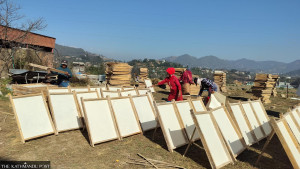Editorial
Absent state
Govt must take stringent actions against private sellers hoarding gas
On Monday, Bishnu Kumari Sunuwar from Balaju was among the approximately 6,000 people who queued for hours to refill their gas cylinders at the National Trading Limited in Teku. The line started at the gates of the agency responsible for the import and distribution of goods and snaked all the way along the banks of the Bishnumati River. A few wore masks to subdue the overpowering stench coming from the mix of garbage and human excreta in the river; most just covered their noses with their hands. For Bishnu Kumari, who had been waiting in line for over six hours, the foul smell combined with heat exhaustion was too much to bear. She passed out. As her neighbour sprinkled water on Bishnu Kumari’s face, she complained of having had to survive on beaten rice and noodles for over a week due to the fuel shortage.
The scarcity of cooking gas during the winter is a perennial problem. In February 2012, residents of Bhaktapur took control of three vehicles loaded with cooking gas on the Araniko Highway due to frustration caused by the shortage. This year too, Nepali households have been reeling under the scarcity of cooking gas for the past two months and there is little sign of relief. Initially, the state-owned Nepal Oil Corporation argued that the shortage was due to maintenance works at the Barauni Refinery of the Indian Oil Corporation in Bihar. It has, however, been over two weeks since the refinery resumed operations. In addition, the state oil import monopoly claims to have increased daily imports from 40,000 cylinders to 70,000 for the past week to ease the shortage. As the average daily national demand is 56,000 cylinders, there are 14,000 cylinders in excess. But this does not seem to be reaching consumers, as seen along the Bishnumati on Monday.
Consumer rights groups have long been arguing that the shortage is an outcome of hoarding by private sellers. Various government-monitoring committees have verified this. Rights groups and some NOC officials further argue that the problem reaches right to the top. The collusion of the Minister of Commerce and Supplies with the State Minister for Commerce and Supplies and private gas sellers, they say, sought to create an artificial shortage to remove acting Managing Director Chandika Prasad Bhatta, who refused to go easy on tanker and gas station owners accused of oil theft seven months ago. To add fuel to the fire, Bhatta was ousted on Monday, just eight months since being appointed.
The government not only needs to facilitate the smooth supply of gas now, but also restore the people’s trust. Towards that end, it should immediately enforce the Essential Services Mobilisation Act, which has provisions of imprisonment and fines for anyone disrupting the delivery of essential services. The government must not capitulate to demands from private sellers and strictly punish hoarders. Furthermore, the Ministry of Commerce must also address the allegations that its officials are colluding with private sellers. Nepali citizens deserve an answer.




 10.12°C Kathmandu
10.12°C Kathmandu














